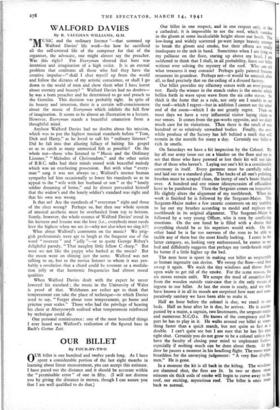WALFORD DAVIES
By R. VAUGHAN WILLIAMS, O.M.
cc mUSIC and the ordinary listener "—that summed up Walford Davies' life work—for how he sacrificed all the self-centred life of the composer for that of the organiser, the advocate, one might almost say the preacher. Was this right? For Everyman showed that here was intention and imagination of a high order. It is an eternal problem that confronts all those who feel they have the creative impulse—" shall I shut myself up from the world and follow the dictates of my artistic conscience, or shall I go down to the world of men and show them what I have learnt about eternity and beauty? " Walford Davies had no doubts— he was a born preacher and he determined to go and preach to the Gentiles. This decision was probably right. In spite of its beauty and intention, there is a certain self-consciousness about the music of Everyman which_inhibits the full flow of imagination. It seems to be almost an illustration to a lecture. However, Everyman stands a beautiful emanation from a thoughtful mind.
Anyhow Walford Davies had no doubts about his mission, which was to put the highest musical standards before " Tom, Dick and Harry," as he loved to call his " ordinary listener." Did he fall into that alluring fallacy of baiting his gospel so as to catch as many unmusical fish as possible? On the whole not—those who listened to " Music and the Ordinary Listener," " Melodies of Christendom," and the other series of B.B.C. talks had their minds stored with beautiful melody which was an everlasting possession. But with what " every- man " sang it was not always so ; Walford's intense human sympathy led him occasionally to lower his standards so as to appeal to the " wife with her husband or son " or the " lonely soldier dreaming of home," and he almost persuaded himself that the widow's and the lonely soldier's standard was right and that his own was wrong.
Is that so? Are the standards of " everyman " right and those of the elect wrong? Perhaps so, but then our whole system of musical aesthetic must be overhauled from top to bottom. Surely, however, the whole essence of Walford Davies' creed in his lectures and lessons was the love (i.e., everybody must needs love the highest when we see it—why not also when we sing it?) What about Walford's comments on the music? We prig- gish professionals were apt to laugh at the frequent use of the word " reverent " and " jolly "—or to quote George Robey's delightful parody, " That naughty little fellow C sharp." But were we not like the puppy who barked at the moon? But the moon went on shining just the same. Walford was not talking to us, but to the novice listener to whom it was pro- bably a revelation that a chord could be reverent or a modula- tion jolly or that harmonic frequencies had almost moral qualities.
When Walford Davies dealt with the expert he never lowered his standard ; the music in the University of Wales is proof of that. Welshmen are rather apt to think that temperament can take the place of technique—to which Davies used to say, " Forget about your temperament, go home and prictise your scales." Those who had the privilege of hearing his choir at Aberystwyth realised what temperament reinforced by technique could do.
One personal reminiscence : one of the most beautiful' things I ever heard was Walford's realisation of the figured bass in Bach's Gottes Zeit.






























 Previous page
Previous page